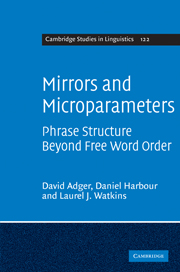Book contents
- Frontmatter
- Contents
- List of tables
- Acknowledgements
- Abbreviations and notation
- Kiowa phonemes and orthography
- 1 Introduction
- 2 Nonconfigurationality and polysynthesis
- 3 The clausal spine
- 4 Making mirrors
- 5 Interface properties of clausal domains
- 6 Anti-quantification and the syntax–semantics interface
- 7 Conclusion
- Appendix
- References
- Index
2 - Nonconfigurationality and polysynthesis
Published online by Cambridge University Press: 26 January 2010
- Frontmatter
- Contents
- List of tables
- Acknowledgements
- Abbreviations and notation
- Kiowa phonemes and orthography
- 1 Introduction
- 2 Nonconfigurationality and polysynthesis
- 3 The clausal spine
- 4 Making mirrors
- 5 Interface properties of clausal domains
- 6 Anti-quantification and the syntax–semantics interface
- 7 Conclusion
- Appendix
- References
- Index
Summary
Introduction
In this chapter, we discuss a number of the properties that make a syntactic analysis of Kiowa challenging, focusing on the freedom of argument order which the language displays.We show how Kiowa falls into the broad typological class of nonconfigurational languages, and outline a number of theoretical approaches to such languages. A landmark study in this area is Baker 1996, which proposes a theoretical system intended to provide a unified view of these languages, bringing them under a single ‘macroparameter’, the Polysynthesis Parameter. Baker's proposal is a development of an older idea for dealing with free word order languages first suggested by von Humboldt (1836): apparent overt arguments are to be thought of as being in adjoined positions, linked to a clause-internal clitic.
We use this theory as a lens through which to investigate the structures of Kiowa, and we show that Kiowa indeed displays almost all of the hallmarks which one would think should firmly place it under the Polysynthesis Parameter's purview. However, the approach, in the end, turns out to be inadequate for DPs whose semantic type is more complex than that of a simple referential element. We show that Kiowa has a number of nominals which have semantic types incompatible with the kind of analysis of the language that the Polysynthesis Parameter would predict: quantificational elements, especially bare quantifiers, and focus-marked elements. It turns out then, that we need a different theory of clause structure which is compatible with a nonconfigurational typological profile.
Information
- Type
- Chapter
- Information
- Mirrors and MicroparametersPhrase Structure beyond Free Word Order, pp. 25 - 60Publisher: Cambridge University PressPrint publication year: 2009
